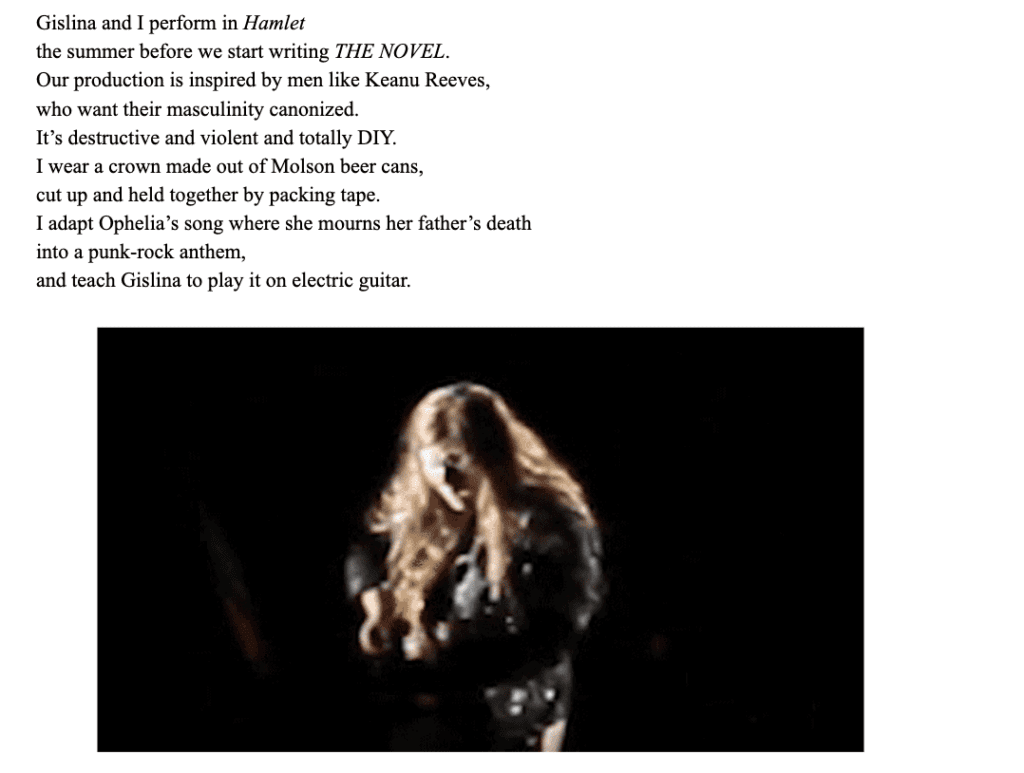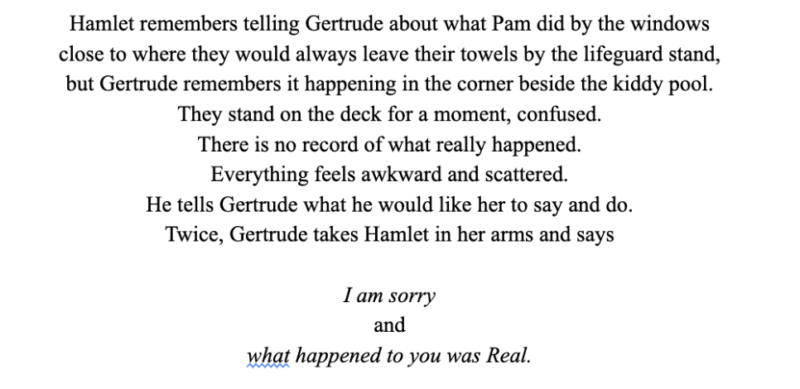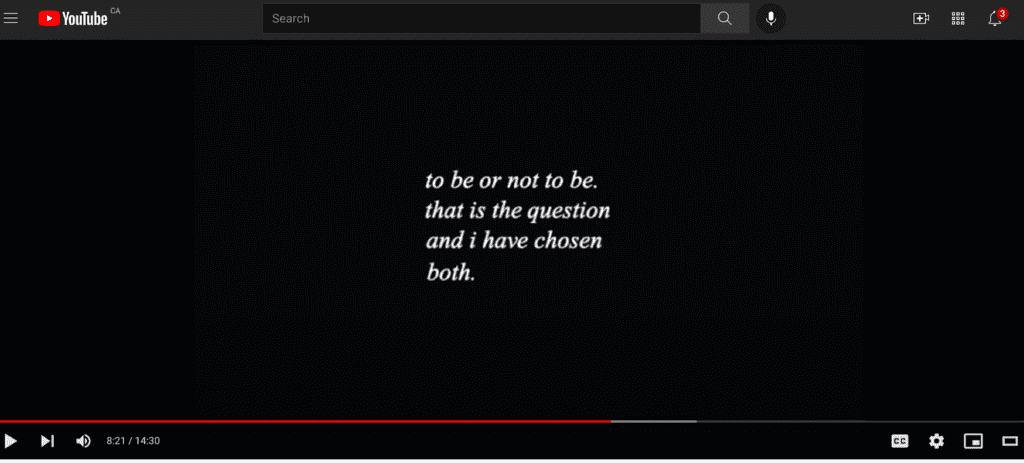Co-materializing Across Screens: We Quit Theatre’s 805-4821
12 October 2022By Tyler Cunningham

On a Thursday night in October 2021, like many other weeknights, I sat down at my small desk, opened my laptop, and logged onto the blank canvas where most modern-day, creative endeavors originate: Google Docs. The blinking cursor beckoned me to press my fingers to my keyboard, but I resisted since I was waiting for the start of 805-4821, a play within Google Docs conceived by the Winnipeg-based theatre company We Quit Theatre. While the piece saw a live, in-person performance history prior to the pandemic, this iteration at the Toronto-based Buddies in Bad Times’s Queer, Far, Wherever You Are series was a part of the show’s run adapted for an online space. As if the lights were dimming in the theatre, the cursor began producing words that filled the Google Doc. The show had begun.
The playwright, Dasha Plett, was the sole performer of the piece and as she typed into the Google Doc, those of us that shared the digital space inside the Google Doc bore witness to the story unfolding word by word. She began by chronicling her initial encounter with Gislina Patterson, the show’s director and dramaturge, during a production of Shakespeare’s Hamlet.

Dramaturgically foregrounded by Plett and Patterson’s playful, nonlinear storytelling that oscillates between deeply moving testimonies of radical, queer intimacy and hyperlinked YouTube videos, pasted photos, GIFs, and pop culture references, “to be or not to be?” becomes the foundational question in 805-4821. Hamlet becomes both a genesis for Plett’s and Patterson’s relationship as well as a queered figure that jumps across, and between, bodies and temporalities. After recounting a 1977 production of Hamlet directed by Andrei Tarkovsky, in which Plett describes the film as being critically lauded as trivial and sluggish, she perceives a kinship between herself and this abject, transitive Hamlet:
Throughout 805-4821, Plett interchangeably refers to herself both as “I” and “Hamlet,” as if the fictitious figure of Hamlet amalgamated with Plett in a cross-corporeal emergence into each other, a co-materialization that redresses the Shakespearean motif: to be and not to be. I am reminded of scholar Jack Halberstam when he writes: “The queer art of failure turns on the impossible, the improbable, the unlikely, and the unremarkable. It quietly loses, and in losing it imagines other goals for life, for love, for art, and for being.”1 Hamlet becomes this metaphor for the impossible and for failure, a figure of the intermediary that Plett continuously revists and re-embodies as she recounts her autoethnographic story of Trans-becoming and the politics of queer, interstitial (il)legibility.
While this production was adapted to be mounted online in the midst of the pandemic, and in spite of Google being a mega-corporation rife with racist, ableist, sexist, and Euro-centric neoliberal logics and biases, I found myself gripped by the potential Google Docs offered as a queer epistemlogical paradigm of not-quite. My experience of the Google Doc was, in many ways, analogous to the liminal subjectivity that was expounded throughout the play. As Plett “performed” the work, and while I knew, or at least trusted, that Plett was the agent on the other end of the network, I could never be sure. Similarly, while I could gather that I was a part of an audience of at least eight others (based on the icons on the top-right corner of the Google Doc that disclose who is “in” the document with you), their hauntological presence very well might’ve been the ghost of Hamlet’s father.
Zig-zagging between various hyperlinked media, including YouTube videos Plett and Patterson produced specifically for the show, the montage that drew on various temporalities was both central to the dramatic storytelling of the work as well as the dramaturgical threads that underscore queer time. The narrative style stitches disparate bodies of philosophy and literature with deeply intimate testimony, a compositional mode that produces a queer poetic relying on a logic of collective subject formation. Likewise, the capacity for the Google Doc to emerge as a hypermedium linking disparate genres of media reinforces a type of nonlinear, queer subject construction that is the semiotic focus of 805-4821.
Even upon the show’s conclusion, the archival “remains” of 805-4821 continues to live on as a queered, living document that confronts the western inclination towards an empirical and fixed epistemology.
The show’s “closing” saw the document become filled with praise, questions and constellations. One person was reminded about their college experience at the University of Winnipeg, and another left their phone number so that Plett and Patterson could call them. One person was curious what animal they were assigned by the Google Doc algorithm.
Despite its ephemeral emergence, the document still more permanently remains to be altered, deleted, personalized, re-written, and remembered. Even as I write this, I cannot be sure whether my citations are indeed the “original,” as users might have gone back and altered Plett’s text since that evening. Google Docs became a queer site where the empirical became highly equivocol, where presence unearthed itself as mythology. Such is the remembrance and revision of trauma in the transitional state that Plett traverses in the rubble of her own memory in 805-4821:

Memory is awkward. It’s scattered. It’s queer. But it’s real. Plett recalls her own childhood and yet types in the third person, denoting herself as Hamlet, and encapsulates an ontology of memory that rapidly oscillates between first- and third-person perspectives. It is in this agile play between memory as subject and memory as object—that the in-flux Google Document became a central figurative cornerstone—not only did the interface dramaturgically stand in for the capacity of Trans bodies to circumvent the perimeters of “to be or not to be”, but it it also gestured towards the amorphous and nebulous essence of memory in and of itself. If memory is material for us to queer and refigure, a material that is silmultaneously us and other, than Plett opened up the Google Document as a figurative palimpset that reflects on her revisionist remembering of traumatic memory.
In the last minutes of 805-4821, Plett drops a hyperlink to a YouTube video in which she speaks to Hamlet one last time. They are both lost, but they have found each other. Plett asks to burn the story of Hamlet’s body to the ground. She asks Hamlet to fuck.
It is perhaps ironic that I introduce 805-4821 as a play for Google Docs when it also concludes in a YouTube video. Or, maybe, to be not-quite is the entire point. At the closing of the scripted performance of 805-4821, Plett gestured back to Hamlet as she rejected the dialectical and claimed the impossible in Hamlet’s canonical question. Trans-ness is to imagine alternatives for life, for love and for memory, alternatives where Plett forges metaphysics for her and Hamlet to fuck, to lament together, or to marvel in their disorientation. If queerness, as scholar and critic José Esteban Muñoz writes, “exists…as an identity that can be distilled from the past and used to imagine a future,”2 805-4821 redresses both “real” and imagined temporalities, ripe for revision and rewriting, and pursues queer futures that embrace the imaginable multitudes found in the interstice of to be and not to be.
- Jack Halberstam, The Queer Art of Failure (Durham: Duke University Press, 2011), 88.
- José Esteban Muñoz, Cruising Utopia: The Then and There of Queer Futurity (New York: New York University Press, 2009), 1.
805-4821 by We Quit Theatre was performed from October 13-17, 2021 virtually on Google Docs from Toronto, ON.
Feature image: 805-4821, 2021 by We Quit Theatre. Screenshot by Tyler Cunningham.



